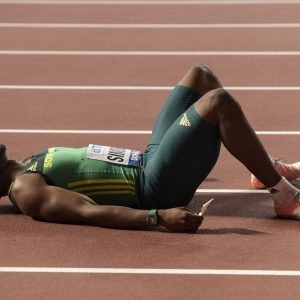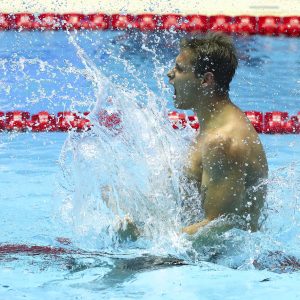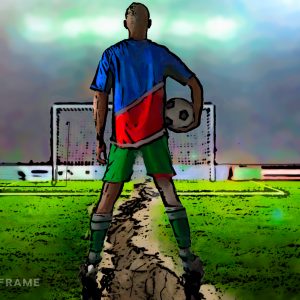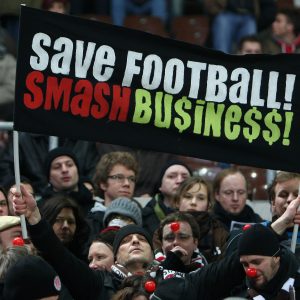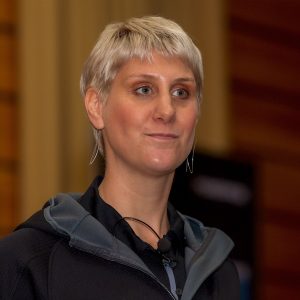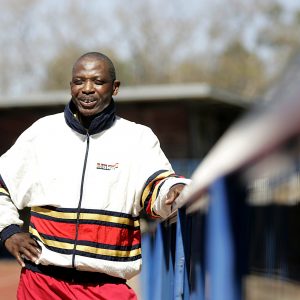Olusoji Fasuba’s journey from athletics to the navy
Africa’s fastest man has had an interesting career path since hanging up his spikes. The Nigerian, who holds the continent’s 100m record, explains why he left athletics at 27 for Britain’s Royal Na…
Author:
26 February 2021

If ever there was a statistic that encapsulates Nigeria’s prowess in athletics, it is this: sprinters of Nigerian descent hold records on three continents – Asia, Europe and Africa.
Onitsha-born Francis Obikwelu, who had previously represented Nigeria at the Olympic Games, announced in 2001 his decision to run for Portugal. While he had been residing in Lisbon for close to five years by that point, the decision came as a kick in the teeth for Nigerian athletics. Three years later, in the colours of Portugal, he won a silver medal at the Games in the men’s 100m event, setting a European record of 9.86 seconds in the process.
Asia’s 100m sprint record is held jointly by 29-year-old Femi Ogunode, who has run in the colours of Qatar since 2009, and China’s Su Bingtian. In the 2015 Asian Athletics Championships, Ogunode broke the championship record twice and set a new Asian 100m record of 9.91 seconds that Bingtian matched in 2018. Incidentally, previous Asian record holder Samuel Francis is also of Nigerian descent.
Related article:
Africa’s record belongs to Olusoji Fasuba. Born in 1984, Fasuba burst on to the scene in 2003 and was one of the Nigerian quartet who won bronze in the 100m relay at the 2004 Athens Olympics. Two years later, during the IAAF Grand Prix in Doha, he bested Frankie Fredericks’ African 100m record of 10 years, running a 9.85 seconds mark.
But he retired from athletics in 2011 and joined the Royal Navy, undertaking a gruelling 10-week training programme and a three-month professional course before being posted to the logistics department of the British naval base in Devonport.
His father’s footsteps
Even though his father had been in the Nigerian navy, the decision still came as a shock. At 27, Fasuba was still some years removed from retirement age and seemed set to dominate African athletics for some time to come. For Fasuba, however, it was a no-brainer.
“I ended my career earlier than planned,” he said. “I had achieved a lot in the sense that I won an Olympic medal, World Championship medal, broke the African sprint record and became the first African to win an indoor gold for the continent. It doesn’t get any better than that.”
So why did he do it?
“I wasn’t getting the support needed to achieve my aims. When I wasn’t getting the right support to achieve the goal or take the country further, I just decided to make a way for my family.
“I could say I got extremely frustrated, not at my performance but what the country had done. They also didn’t bother trying to see how to help me fulfil my desire to do more for my country and continent. So I sat down in Portugal after I got injured at the Beijing Olympics, [and] I realised no one cared how I could get better.
“Bear in mind, the year before I had won the 2008 World Indoors. I got no message from the federation to check how I was faring or doing mentally. No one cared. Financially, it had cost me a lot of money. I just felt I couldn’t go through this all over again.”
Related article:
Fasuba’s tale is shockingly common among Nigerian athletes. Obikwelu, who got injured competing at the 2000 Olympic Games, was similarly left to fend for himself. He had to fund expensive corrective surgery in Canada out of his own pocket, which ultimately forced his hand and led to him embracing Portuguese citizenship.
Hurdler Glory Alozie elected to run for Spain on the same premise in 2001. Ogunode was frustrated by internal politicking, and current 400m world champion Ebelechukwu Agbapuonwu, who moved to Bahrain in 2014 and now goes by Salwa Eid Naser, has evinced nothing but disdain for the Athletics Federation of Nigeria (AFN) since.
Fasuba had a number of offers to switch allegiance from the Middle East and Europe. “I would like to say I was patriotic all through my time because I got a lot of offers – large money to transfer to other countries,” he said. “I decided not to because I had faith that things would change. [I thought] if I managed to achieve all my goals, someone up there [in the government] would say, ‘Fasuba has done so much, let’s see what we can do to propel him to greater heights.’
“Instead, they treated me like a man on a personal mission who is no longer doing it for the country. I felt a lot of pressure in the sense that I was carrying the country alone.
“I served the country well. All my sweat working hard, five to six hours in the hot sun in Nigeria, training. Travelling around the world competing and almost involved in plane crashes around Europe as well, doing it all for the country. I have no regrets and if I got another chance I’d do it all over again. If others can’t handle this and want to leave, I’ll support them because if I could attain that height and got no support, then what’s the future plan for others?
“Nigeria is losing loads of athletes now due to bad management. The blame will always fall on the athletics body in the country because they’re meant to put things in place. They love to shift the blame to the ministry. Yes, the ministry has a role to play, but the federation deals directly with the athletes. If you can’t do your job, then you should step down and let someone else try instead of holding on to power like their life depends on it. That’s where the problem comes from.”
How to fix this problem
AFN spokesperson Dare Esan conceded that the sports body has not always been upstanding in its approach to athletes’ welfare.
“In terms of the allegations [Fasuba] levelled against what the AFN has done, that encouraged a lot of Nigerians to change nationality. Yes, he’s right,” Esan admitted. “I remember when he competed and he had that problem [the injury at the Beijing Olympics], a lot of things happened that a lot of people didn’t even know about.
“When you come for an event, for you to get a ticket refund becomes a problem, which should be automatic. To even get enlisted for the IOC [International Olympic Committee] scholarship fund, instead of picking the right athletes, they pick the wrong ones and then don’t even pay them what they should be getting. When people in positions of authority are given money to give to athletes, they make it look as if it’s their own money, because the athletes are not aware that the money has been approved for them. That is the practice in Nigeria; that is why a lot of them want to change nationality.”
Related article:
A leadership crisis has rocked the AFN over the past two years, with two factions claiming legitimacy, each led by a different president. It has resulted in a peculiar situation. Shehu Gusau, with whom World Athletics corresponds despite his status as leader of the minority faction, is not recognised by the government, stakeholders or athletes, and just last year instituted court proceedings against the Ministry of Sports. As a result of this impasse, athletes have been denied their grants and allowances, are not getting any competition and have no recourse.
According to Esan, this state of affairs makes it even more difficult for the AFN to discourage athletes from switching their international allegiance.
“Unfortunately, the one reason this is still continuing is the crisis in the federation. Gusau is the one who has the password of the AFN and is communicating with World Athletics. So who will the athletes run to? It has put them in a very serious dilemma. So, the problem has not abated.”
Related article:
World Athletics put more stringent measures in place in 2017 – with African countries specifically in mind – to dissuade defections, demanding that athletes be granted full nationality and given passports before they are allowed to compete in different colours. However, if African federations like the AFN do not clean up their act and prioritise the welfare of their athletes, it may well be impossible to stem the flow of athletes out of such countries.
Fasuba has some ideas to improve the administration of the sport in Nigeria, but is under no illusions as the landscape is fiercely political and the problems are deep-seated.
“At the moment, I think the role I’d love to play will be in an advisory capacity. People always ask when I will be coming to get on the board. I am not based in Nigeria and it’s hard because Nigerian politics is not meant for me. People like foot soldiers and worshippers, but I can’t survive there because I am blunt and won’t pretend to be fine when athletes are not catered for yet officials are growing fat on grants meant for the athletes.
“What is currently going on at the AFN is an eyesore and disgusting, as they are determined to cripple athletics in Nigeria and wreck it to the ground. They still come out lying that what they’re doing is for the best. They’ve been there for three years and what has happened? National athletes going cap in hand by begging for money. Some of these athletes can’t afford to take care of themselves.
“The change to stop the rot in Nigerian sports or athletics will not go away in a year or two. We are talking of years of meticulous planning and focus on what [needs] to be done. Even just pumping in money will not stop the athletes leaving now.”
Family obligations
Two things ultimately informed his decision to quit athletics for good: a moment of morbid clarity and a desire to give his family options.
“I asked myself an honest question: if I retire now, what will happen to me? No pension, no one to look after me. I wondered what would happen if I died. Would people start looking for money for my funeral or look after my parents?”
Viewed in this light, his decision no longer seems quite so unexpected. Married to fellow athlete Ngozi Nwokocha, Fasuba prioritised security over personal ambition and seeking glory for a national association that offered him no support or encouragement.
“I thought of my family and a decent life plan. So when I picked up the Royal Navy, I realised that I’d pick up a pension. It would also provide my kids with dual nationality and the freedom to be anything in life, which was my main aim for leaving Nigeria.
“Now they have a choice and platform to think and live better. I’m quite happy that I sacrificed my athletics career for them to have a better life.”
Away from the high of top-tier competition, Fasuba is finding fulfilment in his second career as a logistician in the Royal Navy. He has also immersed himself in education, picking up a number of different certifications, most notably in business administration. He is working towards a bachelor’s degree in logistics and is open to achieving sports-related qualifications in the future.
Related article:
“I think an administrative role will be my target in the future. Coaching? No, I don’t think I will be a patient coach. My coach said – and I believe it – that you may be a great athlete, but that doesn’t mean you have what it takes or understand what an athlete is going through to get there. It comes naturally, and so if I don’t get a natural athlete it will be tough to succeed in coaching.
“Aside from the role of an administrator, I’ll look to support the athletes by mentoring them. That’s more of the role I see myself playing in the future. I may decide to go for a coaching qualification in the future, but right now my focus is on the navy.”
Related article:
Fasuba still runs, though. Despite being unable to train as his ship was at sea, he won the 100m sprint event at the Inter-Services Athletics Championships in 2016, making him the fastest man in the British armed forces.
He remains the only African to have ever won gold at a World Indoor Championship. In 2008, he came out on top in the 60m dash, in a time of 6.51 seconds. Remarkably, considering he is an Olympic medallist, he described that triumph in Valencia as his “proudest moment”. His reasoning? “No matter what, even if another person from the continent wins another, I will still be the first African to do it.”
About his 14-year-old African sprint record, however, he is a little less enthused, as he considers it a symptom of stagnation in the continent’s sprint scene. But he tips a countryman to exceed that mark soon, if the authorities are able to clean up their act and offer him the support they never offered Fasuba.
“Records are meant to be broken,” he said. “If they are not broken, then it shows we are not making any progress or moving forward as a continent. I’d say I’m pretty surprised because we’ve got South African Akani Simbine who is close to it. Nigerian Divine Oduduru, too, is coming closer and I don’t think he’s just a flash or one-hit wonder. I believe he’s still going to come back on track.
“That’s why the country must back him to achieve that. We have other stars coming up on the continent as well. I’ll say the record will go very soon. I can’t predict who can do it, but I know it will be gone soon.”

